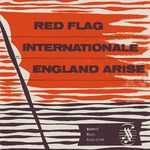> Folk Music > Records > The Internationale
The Internationale
 |
The Internationale Workers’ Music Association WMA 101 (7" EP, UK, 1958) |
 |
Recorded in Glasgow by Bill Leader;
Sleeve design by Brooks
Musicians
The Glasgow Socialist Singers (conductor James Callan);
The Glasgow YCL Choir (conductor James Service);
conducted by Alan Bush
Tracks
Side 1
- The Internationale
with brass and percussion ensemble - The Red Flag
to the tune The White Cockade
Side 2
- The Red Flag
to the tune Maryland - England Arise
Sleeve Notes
- The Red Flag
Words by Jim Connell (1852-1929), Irish working-class revolutionary, written in 1889 and sung for the first time within one week of its publication that year in the socialist periodical, Justice. Connell wrote in 1920 about a “series of great struggles which got him into the mood which enabled him to write the song.” These were the Irish Land League, the struggle of the Russian revolutionaries, the hanging of the Chicago anarchists and the great dockers’ strike of 1889, which “aroused the whole of England.”
Connell intended the words to be sung to the tune of The White Cockade, a Scottish reel. In the British Labour Movement it has traditionally been sung to the tune of a German hymn, Der Tannenbaum, known in Britain as Maryland.
- The Internationale
The original French text written in 1887 by the Communard, Eugene Pottier, was set to music in 1888 by Paul Degeyter and sung for the first time in June that year at a working-class festival in Lille, France. The version of the tune is this recording is the authentic original one; it was copied in Paris in 1936 by Alan Bush from a manuscript copy, signed by the composer.
- England Arise
Words and music were written in 1886 by the Utopian socialist, Edward Carpenter (1844-1929). It is one of the most widely known songs of the English Labour movement.
Acknowledgements and Links
I copied the left-hand cover picture and sleeve notes from 45cat.com and discos.com, and the right-hand cover picture and the album release date of 1958 from Topic’s 70th anniversary issue, Three Score and Ten.
Thanks to Alistair Banfield for help and information.

